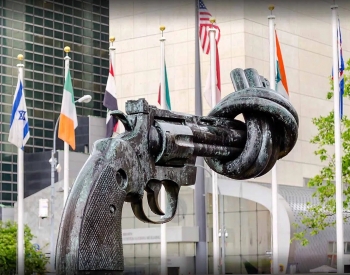The approval of nearly all resolutions paints a hopeful vision of progress during a period dominated by instability, uncertainty, and suffering. However, improvement is not ensured—as demonstrated by the lack of consensus on most measures. Global security not only relies on those who support disarmament but also on those who do not. As long as impunity remains, nuclear weapon states and regimes promoting armed conflict will continue to bring catastrophe and disrupt moments of hope.
On the one hand, states leading global conflicts must engage in disarmament and cease harmful operations. On the other, it is the mission of the other states to fight impunity, holding those who defy agreements and break laws responsible. Without measures that directly uphold accountability, there is little chance that nuclear states and instigators of conflict will agree to work toward disarmament.
The past month’s meetings of the UN First Committee provided an opportunity for this transition. Representatives called for accountability, but the question is whether their subsequent actions will truly drive the fight against impunity at a time when it is so desperately needed. While statements condemning violence were delivered every day, the resolutions produced held the true power.
The indecisiveness demonstrated throughout voting sessions did not reflect a desire for opposing states’ to work together; multilateralism was not achieved on a global, expansive scale. The process of voting on Japan’s draft resolution L.61, “Steps to building a common roadmap towards a world without nuclear weapons,” proved this to the utmost degree. This resolution took 18 separate votes and was widely debated, yet its approval still does not ensure direct measures to fight against nuclear powers.
South Africa was one of the nations that voted against this resolution, explaining that “Not only does this resolution expect Member States to take gradual steps, but it wants to require Member States to build a common roadmap moving towards, but never attaining, a world without nuclear weapons.” During a time when nuclear threats are increasingly imminent, gradual and indirect progress is not what will produce the necessary change. He continues, “The resolution sets the disarmament agenda back, creating conditionalities for disarmament that can never be reached. It tries to make retaining nuclear weapons more palatable by reducing the risk of keeping, maintaining, and modernizing them.”
The language of this resolution appears hopeful but reflects hesitance to take more drastic impactful steps. This form of compromise, where instant accountability is sacrificed to maintain relations, is common to many proposals. Introducing resolutions requires states to face this dilemma: harsher methods may be needed, but gradual steps are easier to gain approval for.
The achievements of the First Committee during this conference must indeed be recognized and supported, but it is naive to assume that every decision is destined to change our status of global insecurity. The efforts by most states to strengthen disarmament efforts can be applauded, but the looming threat of armed states who voted against crucial resolutions must also be recognized. Reaching a unanimous consensus may not be possible, but narrowing the gap of disagreement and working towards less conflict is within reach—so long that accountability is demonstrated and human lives are prioritized.
To read more, please visit:
- https://reachingcriticalwill.org/disarmament-fora/unga/2022/statements
- https://press.un.org/en/content/first-committee
by Nicole Piusienski




